外研高二选修6 Module 1 Small Talk模块复习课件(75张)
文档属性
| 名称 | 外研高二选修6 Module 1 Small Talk模块复习课件(75张) | 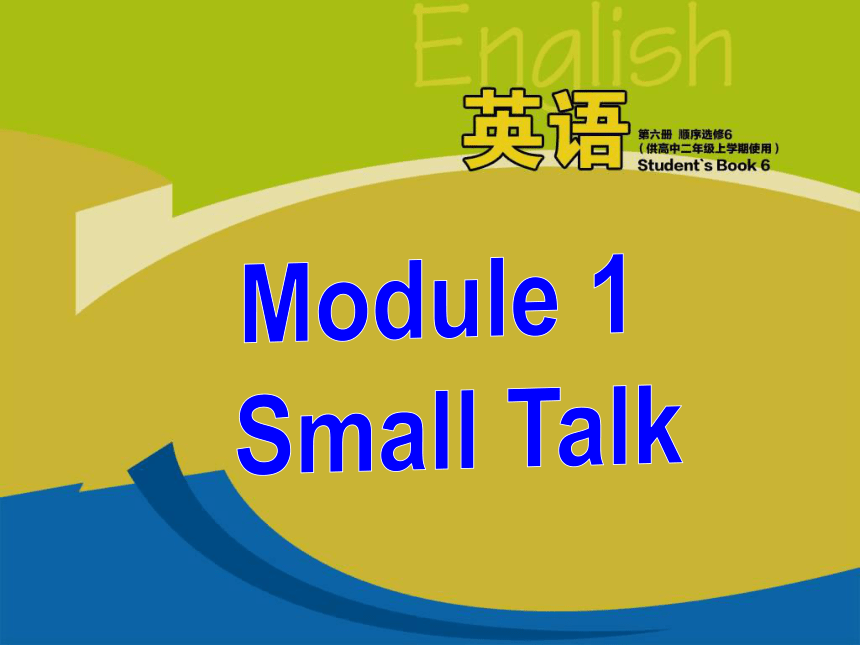 | |
| 格式 | zip | ||
| 文件大小 | 375.9KB | ||
| 资源类型 | 教案 | ||
| 版本资源 | 外研版 | ||
| 科目 | 英语 | ||
| 更新时间 | 2017-01-18 12:03:03 | ||
图片预览

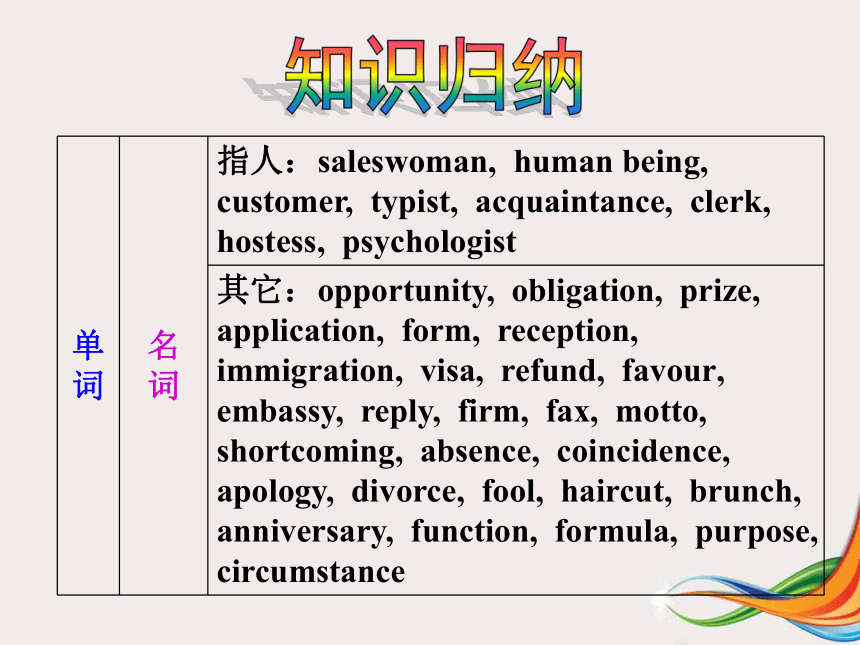
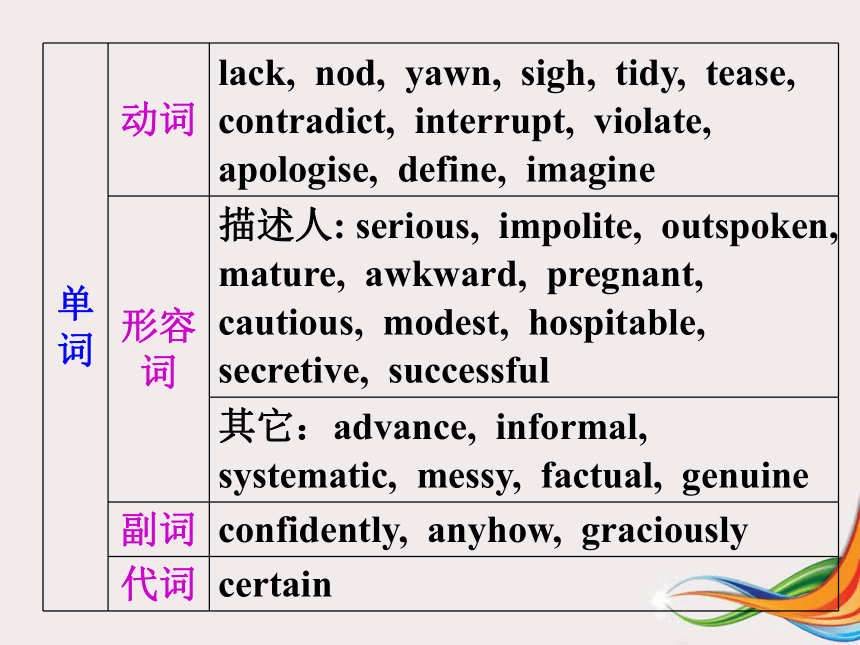

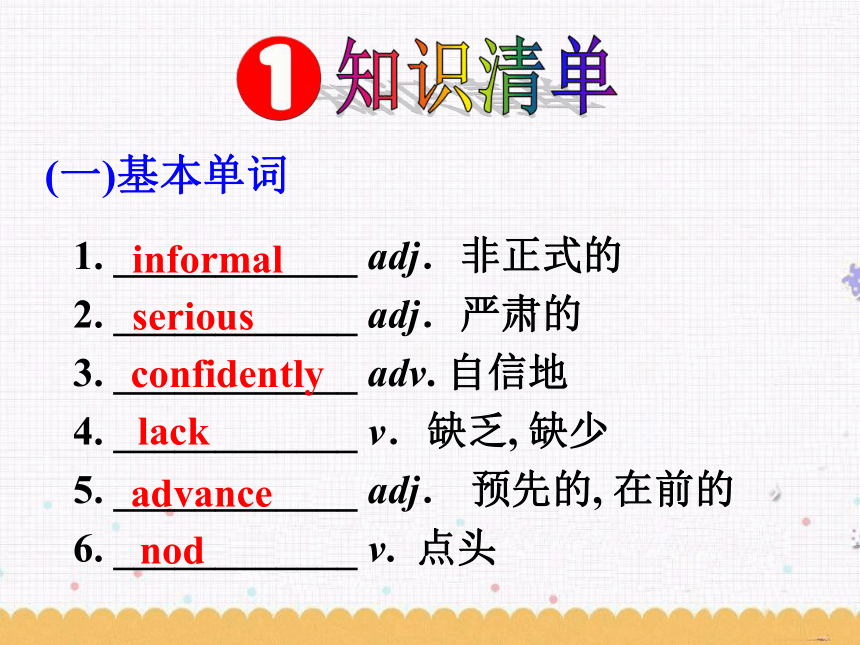
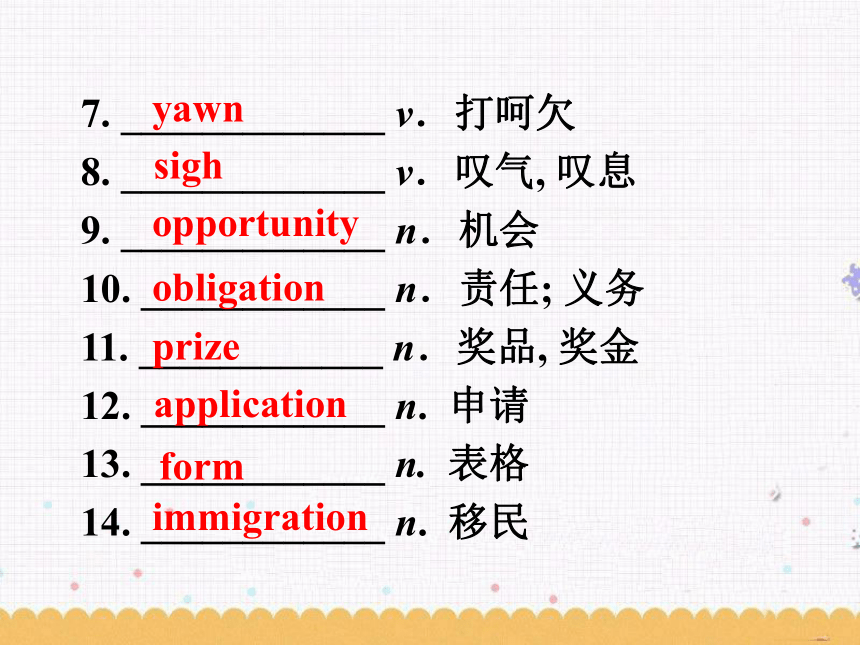

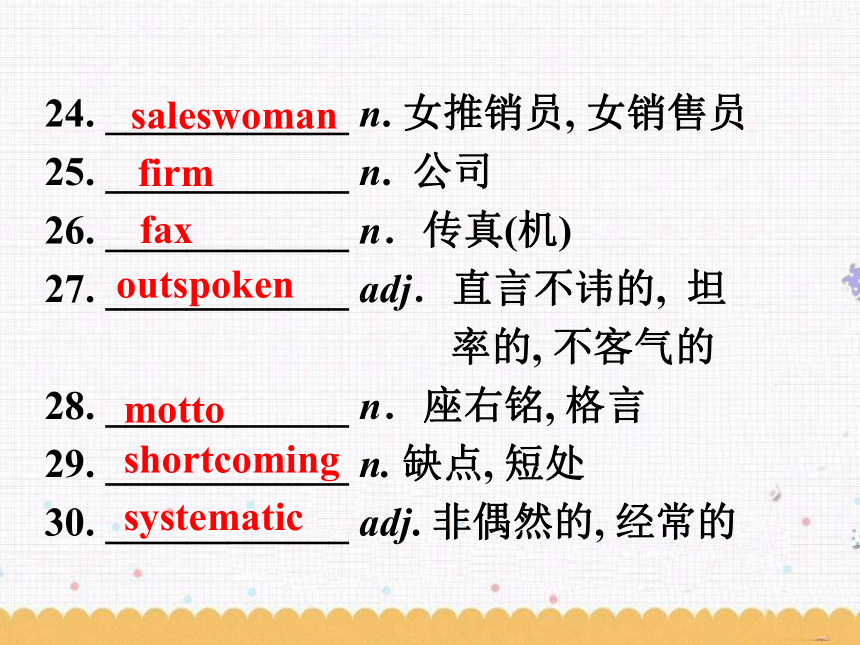
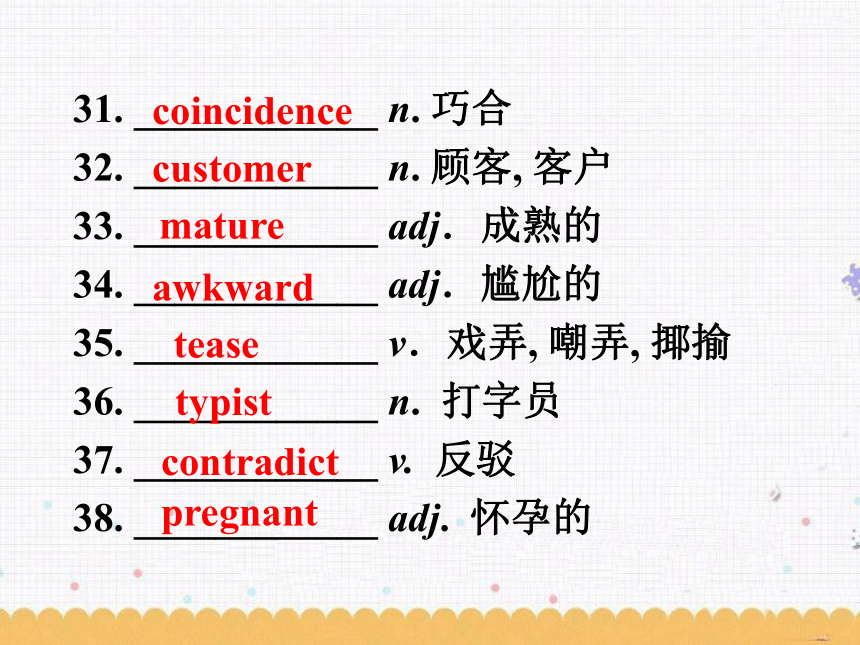
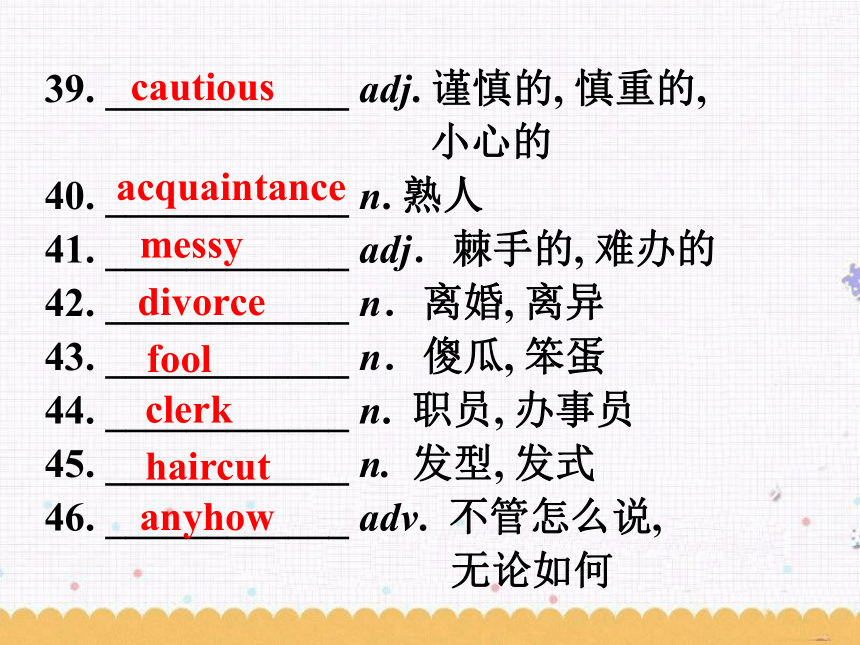
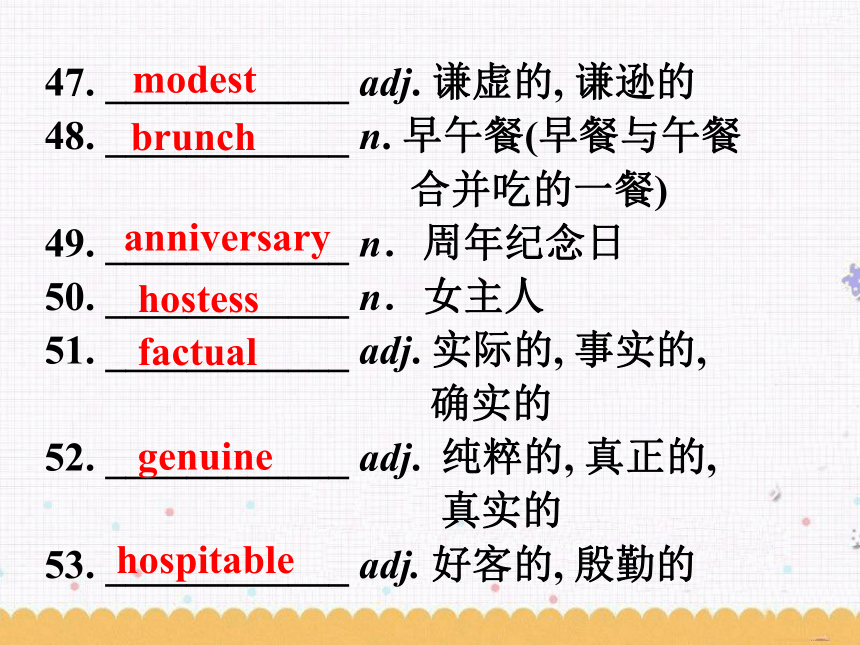
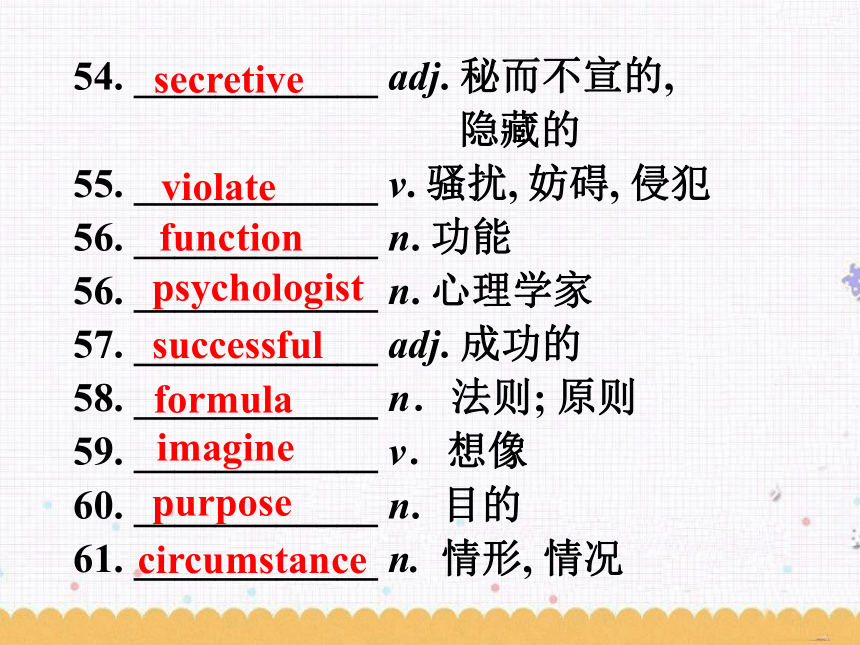
文档简介
课件75张PPT。 Module 1
Small Talk知识归纳知识清单(一)基本单词1. ____________ adj.非正式的
2. ____________ adj.严肃的
3. ____________ adv. 自信地
4. ____________ v.缺乏, 缺少
5. ____________ adj. 预先的, 在前的
6. ____________ v. 点头informalseriousconfidentlylackadvancenod7. _____________ v.打呵欠
8. _____________ v.叹气, 叹息
9. _____________ n.机会
10. ____________ n.责任; 义务
11. ____________ n.奖品, 奖金
12. ____________ n. 申请
13. ____________ n. 表格
14. ____________ n. 移民yawnsighopportunityobligationprizeapplicationformimmigration15. ____________ n. 签证
16. ____________ adj.不礼貌的
17. ____________ v.使……整洁, 整理
18. ____________ n.退款
19. ____________ n.恩惠, 照顾
20. ____________ n. 欢迎会; 招待会
21. ____________ n. 使馆
22. ____________ pron. 某些
23. ____________ n. 回答, 答复, 回信impolitetidyrefundfavourreceptionembassycertainvisareply24. ____________ n. 女推销员, 女销售员
25. ____________ n. 公司
26. ____________ n.传真(机)
27. ____________ adj.直言不讳的, 坦
率的, 不客气的
28. ____________ n.座右铭, 格言
29. ____________ n. 缺点, 短处
30. ____________ adj. 非偶然的, 经常的firmfaxoutspokenmottoshortcomingsaleswomansystematic31. ____________ n. 巧合
32. ____________ n. 顾客, 客户
33. ____________ adj.成熟的
34. ____________ adj.尴尬的
35. ____________ v.戏弄, 嘲弄, 揶揄
36. ____________ n. 打字员
37. ____________ v. 反驳
38. ____________ adj. 怀孕的customermatureawkwardteasetypistcontradictpregnantcoincidence39. ____________ adj. 谨慎的, 慎重的,
小心的
40. ____________ n. 熟人
41. ____________ adj.棘手的, 难办的
42. ____________ n.离婚, 离异
43. ____________ n.傻瓜, 笨蛋
44. ____________ n. 职员, 办事员
45. ____________ n. 发型, 发式
46. ____________ adv. 不管怎么说,
无论如何messydivorcefoolclerkhaircutanyhowacquaintancecautious47. ____________ adj. 谦虚的, 谦逊的
48. ____________ n. 早午餐(早餐与午餐
合并吃的一餐)
49. ____________ n.周年纪念日
50. ____________ n.女主人
51. ____________ adj. 实际的, 事实的,
确实的
52. ____________ adj. 纯粹的, 真正的,
真实的
53. ____________ adj. 好客的, 殷勤的brunchanniversaryhostessfactualgenuinehospitablemodest54. ____________ adj. 秘而不宣的,
隐藏的
55. ____________ v. 骚扰, 妨碍, 侵犯
56. ____________ n. 功能
56. ____________ n. 心理学家
57. ____________ adj. 成功的
58. ____________ n.法则; 原则
59. ____________ v.想像
60. ____________ n. 目的
61. ____________ n. 情形, 情况psychologistsuccessfulformulaimaginepurposecircumstanceviolatesecretivefunction62. __________ n.缺乏; 不存在
→__________ adj. 缺席的; 不在的
63. ___________ n.道歉; 致歉
→__________________ v.道歉
64. ____________ n.打断
→___________ n.打扰; 打断
65. ___________ v.解释; 给……下定义
→___________ n.定义, 释义(二) 派生单词absenceabsentapologyapologise/apologizeinterruptinterruptiondefinedefinition1. _________________ 闲谈, 聊天
2. ________________ 交朋友, 建立友谊
3. ________________ 对……神经紧张/
害怕/胆怯/焦虑不安
4. ________________ 想起, 回忆起
5. ________________ 身体语言, 肢体语言
6. ________________ 把目光从……移开(三) 短语small talkmake friends(be) nervous aboutthink ofbody languagelook away from7. _________________ 社交规则
8. ________________ 除些之外, 另外
9. ________________ 了解(到); 找出(信息)
10. ____________________________
犯使人难堪的错误, 说错话
11. ________________ 因此, 结果
12. ________________ 使某人高兴/
振作起来social rulesin additionfind output one’s foot in one’s mouthas a consequencecheer sb. up13. _________________ 省去, 删去
14. ________________ 知道
15. ________________ 带头, 领先
16. ________________ 炫耀
17. _________________对 ... …谨慎
18. _________________在…方面谦虚的
19. ________________ 经历, 经受(困难、
困境)leave out(be) aware oftake the leadshow off be cautious aboutbe modest aboutgo through1. lack v.缺乏; 缺少(作不及物动词时常
接for或in)
【归纳】
lack (for) sth. 缺少……(不用于被动语态, 多用于否定句中)(一) 单词核心要点 lack common sense/courage
缺乏常识/勇气
lack for nothing 应有尽有
lack n. 没有, 不足, 缺乏
【归纳】
(a) lack of 缺乏……
for lack of 因……的缺乏
【拓展】
lacking adj. 缺乏的, 不足的, 没有的
be lacking in 缺乏(1) lack是普通用词, 指完全没有或部分缺少, 既可指具体事物, 也可指抽象概念, 如智力、知识、勇气等。
(2) shortage指“短缺”, 是就需要量而言。
e.g. Our main difficulty in the area is a
shortage of food and medicine.lack与shortage2. advance adj. 预先的; 在前的
【归纳】
an advance copy 样书
advance party/team
先头部队, 先遣队
advance planning/warning/booking
预先的计划/警告/订票 advance n. 前进; 进步
【归纳】
in advance (=ahead of time)
预先; 事先; 提前
in advance of 在……之前
make an advance in sth.
在某方面取得进步 advance v. 向前, 前进
【归纳】
advance towards a place 向……前进
advance in sth. 在某方面有进步, 前进
advance sb. to a higher position
使某人提升
advance sb. some money
=advance some money to sb.
预付某人……钱【拓展】
advanced adj. 高级的, 进步的, 年老
的; 发达的, 先进的
advanced English/maths
高级英语/高等数学
advancement n.前进; 进展3. favour n. 恩惠; 照顾; 好意; 关心; 支持
【归纳】
do sb. a favour 帮某人忙
ask a favour of sb. 请某人帮忙
win sb.’s favour 得到某人的欢心/好感
in favour 得宠
out of favour 失宠
in favour of 赞成; 支持; 有利于 favour vt. 赞成; 照顾
【归纳】
favour the new plan 赞成新计划
favour sb./sth. 有利于某人/某物
【拓展】
favourable adj. 好意的; 赞成的;
有利的
a favourable answer 满意的答复4. certain adj. 确凿的; 无疑的; 可靠的
1)和of(有时和about)连用, 后接名词或动名词(用about时不跟动名词), “确信; 有把握”, 只能用人作主语。
2)表示“无疑; 确定”时, 后面接不定式, 可以用人作主语, 也可以用事物作主语; 也可用It is certain that...句型表示“(某人做某事)肯定无疑”。3)作定语, 意思为“一定会来到、发生或生效的, 有把握的”。
4)作代词, 意为“(人或物中的)某些”。e.g. Certain of those people were
unwilling to discuss the matter
further. 【归纳】
be certain of 对……有把握
be certain to do sth. 肯定, 确定做……
be certain that ... 肯定, 确定……
make certain 确保, 弄清楚
It is certain that ... 肯定, 确定……
for certain/sure 确凿地; 肯定地certain和sure都意为“肯定的, 确定的”, 都可作表语。
但certain还有“某一, 某种”之意, 可作前置定语, 修饰名词, 而sure无此意。
此外certain可用于it is certain that ... 结构中, 而sure则常用人作主语。certain与sure 5. imagine v.想象; 想, 推测
【归纳】
imagine+名词/代词/doing sth./that-clause
imagine sb./sb.’s doing sth.
想象某人做某事
imagine sb./sth. as
把某人(物)想象成……
imagine what/how/why... 想象……
you can’t imagine...
你想象不到……【拓展】
imagination n. 想象力, 创造力
imaginative adj. 富有想象力的, 爱想象的
imaginable adj.
可以想象得到的(常与形容词最高级或all,
every, only等连用, 可放在被修饰的名词后)
imaginary adj. 虚构的, 幻想的6. apologize v. 道歉
【归纳】
apologize to sb. for (doing) sth.
因某事/做了某事而向某人道歉
【归纳】
apology n.道歉
make an apology to sb. for (doing) sth.
因……向某人道歉
accept sb.’s apology 接受某人的道歉
owe sb. an apology 应向某人道歉7. purpose n. 目的 vt. 企图; 打算
【归纳】
on purpose 故意地 (=by design=
deliberately)
for/with the purpose of (doing) sth.
为了……目的
to the purpose 中肯的; 合适的
(=to the point)
purpose to do sth./doing sth. 企图做某事1. in addition 除此之外; 另外
in addition 该短语为副词短语, 作状语, 可置于句首、句中或句末。用于句首和句中时, 一般用逗号隔开, 但在句末时, 则不需分开。(二) 短语【拓展】
in addition to
除……以外, 相当于besides, 后接名词结构
as well=besides=in addition
除此之外(用作副词)
as well as=besides=apart from
=in addition to
除……之外(用作介词)2. leave out 省去, 遗漏, 不考虑
【拓展】
leave for... 动身去……
leave sb. alone 不打扰某人
leave sth. alone 别管某事
leave over 留下, 剩下; 推迟
leave off 停止
leave sth./sb. behind
忘了带某物; 将某人抛在后面或落下
leave sb. doing 让某人一直3. as a consequence 因此, 结果
【拓展】
as a result 因此, 结果?
as above 如上???????
as before 依旧? ? ? ? ? ? ?
as follows 如下
as a rule 一般说来, 通常? ?
? as a whole 整体看来 as usual 照例, 照常? ? ?
as well 又, 也
as a matter of fact 事实上?
as a result / consequence of
作为……结果, 由于 4. (be) aware of 知道; 意识到
【拓展】
become aware of
对……知道, 明白; 意识到
be aware that/wh-clause
察觉到、意识到
make sb. aware of sth.
使某人明白某事
so/as far as I’m aware 据我所知都可表示“意识到”, 但用法有区别:be aware of 表示感官上的一种知觉; 而 be conscious of 表示内心知觉, 意为“意识到或察觉到的”。
One may be conscious of fear, but not altogether aware of the danger which is going on about him.
一个人可能会在内心里感到恐惧, 但并不能全然觉察到他周围将要发生什么样的危险。be aware of与be conscious of5. show off 炫耀
【拓展】
on show 在展览, 公开展示
show sb. in/out 开门使某人进入/出去
show up 露面, 出现
show in 领进去
show oneself 出席
show sb. over/around 带着某人到处参观
show sb. the door 下逐客令, 驱逐I. 根据本模块所学单词及提示写出所缺单词的正确形式。
1. I make no a________ for what I said — it was a fair comment.
2. Weak men wait for ___________ (机会), but strong men make it.opportunity? apology?3. The only s___________ of the article is that it is too long. Please shorten it to two thousand words.
4. She toured China for the p_______ of getting a better understanding of its civilisation.
5. Don’t ________ (打断) the speaker now; he will answer questions later.
6. Two hundred guests attended an evening _________ (招待会) held in honour of the president’s visit.reception???? shortcoming?purposeinterruptII. 用括号内单词的正确形式填空。
1. Try to act __________ (confident), even if you feel nervous.
2. Some people still think it is _________ (polite) for men not to stand up when a woman comes into the room.
3. She was ________ (secret) about where she’d been last night.
4. A number of patients have been _________ (success) treated with the new drug.successfullyconfidentlysecretive?impolite?III. 选用方框内合适的短语并用其正确形式填空(有两个多余选项)。lack of, be nervous about,
leave out, think of, find out,
show off, be aware of, 1. The children ____________ the danger of taking drugs after they watched the film.
2. You can ________ the details; just give us the main facts.leave out?? were aware of?3. Henry is a kind man who always ________ other people first, never of himself.
4. When Tom heard of this plan he _________________ the whole terrible procedure.
5. Health problems are closely connected with bad eating habits and ________ exercise.lack ofthinks of?was nervous about?1. People with good social skills communicate well and know how to have a conversation.
“疑问词+不定式”句型结构
疑问词可用who, what, which, when, where及how, 后接不定式构成带有疑问词的不定式结构在句中作主语、宾语、表语。(三) 句 式注意:
(1)不能用why to do结构。
(2)疑问词前有时可用介词。
(3)不定式常用主动语态形式。
e.g. I don’t know who to turn to for help.
我不知道该向谁求助。2. It is estimated that 80% of all conversation in English is small talk.
据估计英国人80%的谈话是闲谈。
该句中使用了It is+过去分词+that...结构, 用it作形式主语而把真正的主语放到后面。that引导的从句为主语从句。知识拓展:
It’s said that... 据说
It’s reported that... 据报道
It’s known that... 众所周知
It’s hoped that... 人们希望
It’s thought that... 人们认为
It’s suggested that... 人们建议
It’s believed that... 人们相信提示:
以上句式可转换成sb./sth. is reported/believed/ suggested to do/
to have done...句型。若动作先于前面动作发生, 则用to have done形式。3. We stood around making small talk.
我们站在某人旁边闲谈。
本句中making small talk是现在分词作伴随状语。
e.g. He lay on the grass, looking at the
sky.
他躺在草地上, 看着天空。分词作状语形式的选择:4. In fact, she had never learnt the basic rules of social communication, and as a consequence, she made systematic mistakes every time she opened mouth.
实际上, 她从来就没有学会社交的基本规则, 因此每次张嘴都会犯与之相关的错误。
every time在句子中作连词使用, 引导时间状语从句。以名词短语的形式出现, 用来引导状语从句的短语有:
the moment, the instant, the minute, the second, every time, any time, next time, the first time, the last time。
e.g. I thought of her as a nice and honest
girl the first time I met her.
第一次见到她我就认为她是个诚实
的好女孩。特别提示:
immediately, instantly, directly等词, 也可以用做连词连接两个句子, 表示两个紧接着发生的动作, 相当于as soon as。
e.g. I came directly I got your message.
我一接到你的消息就来了。语法“情态动词+ have done”用法总结【归纳】
could have done可以表示“过去本来能够做某事而实际上没有做”。如:
I could have come here a little earlier, but I’m late because of the bad traffic.must have done表示对过去已经发生过的情况的肯定推测,语气较强。如:
She must have received the book; I sent it a month ago.
may / might have done表示对已经发生过的情况的肯定推测,语气稍弱。might have done还可表示“本可能做某事而实际上没有做”。如:
She didn’t come on time. She may / might have missed the bus.
He might have given you more help, but he was very busy then.should / ought to have done表示“本该做某事而实际上没有做”,其否定形式表示“本不该做某事而实际上做了”,通常含有责备的意思。如:
The flowers have died. I should / ought to have watered them often.
You shouldn’t / ought not to have told them the truth.
needn’t have done表示“本不必做某事而实际上做了”。如:
It is warm today. You needn’t have worn your coat.注意:didn’t need to do与needn’t have done都表示“过去不必做某事”,但didn’t need to do通常表示“没必要做,实际上也没做某事”,而needn’t have done则表示“虽然没必要做,但已经做了某事”。如:
He didn’t need to get up early on Sunday, so he stayed in bed until 10 am.
It’s only five minutes’ walk. We needn’t have taken a taxi.用“情态动词+ have done”结构完成下列
句子。
1. You ___________________________ (wash) the wound with cold water, but you used hot water.
2. I am not feeling well in the stomach. I ________________________________ (eat) so much just now.shouldn’t / ought not to have eatenshould/ought to have washed??3. There was enough time. You __________________ (hurry).
4. I __________________ (lend) you the money. Why didn’t you ask me?
5. They _____________ (go) out because the light’s out.must have goneneedn’t have hurriedcould/might have lent写作【写作任务】
?????? 假设你是李华。你堂兄建华在国外学习,你们经常用英文通信。他即将完成学业,不久前来信就是否回国工作征求你的意见。请根据下列提示回信:
?????? 1. 建议他回国;
?????? 2. 你的理由是:①学有所用,就业容易;
②照顾父母。如何回复电子邮件注意:
1. 词数100左右;
????2. 行文应连贯,内容应完整;
??? 3. 开头语已为你写好, 但不计入总词数。
Dear Jianhua,
?????? I’m very glad to have received the letter you sent me two weeks ago.
________________________________
____________________________________【写作指导】
审题定调:
?????? 本写作要求回复一封电子邮件,属于应
用文,时态以一般现在时为主,人称以第二
人称为主。
布局谋篇:
全文可分为三部分
第一部分:收到邮件的心情;
第二部分:具体回复邮件中所提到的问题;
第三部分:结束邮件。常用表达:
I’m very glad to have received the letter you sent me ...
I’ve been thinking about ...
In my opinion, ...
For one reason, ...
For another reason, ...
I think it will be much more ... for you to ...
I think it’s a good idea for you to ...【参考范文】
Dear Jianhua,
?????? I’m very glad to have received the letter you sent me two weeks ago. I’ve been thinking about the question you asked me. In my opinion, you should come back after you finish your studies abroad. For one reason, what you are studying is badly needed nowadays in China. It will be quite easy for you to find a good job. In fact, I know a few big companies in our city are hoping to hire people like you. For another reason, I think it will be much more convenient for you to look after your parents as they are getting old. Therefore, I think it’s a good idea for you to return. So what are you waiting for?
??????????????????????????? ? ????Best wishes,
??? ??????????????????????????? ??????Li HuaI. 用didn’t need to 或needn’t have done改写句子。
1. It was so near and the taxi we took was not at all necessary.
We _________________ a taxi, because it was so near.needn’t have taken巩固练习2. She said it wasn’t necessary for me to wear formal clothes to the party.
She said I __________________ formal clothes to the party.
3. I paid the bill, but later my friend told me he had already paid.
I ________________ the bill, because my friend had already paid.didn’t need to wearneedn’t have paid?? II. 阅读下面材料, 在空白处填入适当的内容(不多于3个单词)或括号内单词的正确形式。
?????Small talk is very useful as it can make you impress others easily when 1. __________ (compare) to someone who doesn’t say much. It is also important for any kind of work 2. _____ involves meeting and discussing things with people to bethat comparedsuccessful. It’s 3. ___ skill, however, because it can be overdone, making you seem too outspoken, 4. ________ (annoy) or even impolite. So in order to seem genuine, it needs to be learned and practiced.
?????? Small talkers need something to talk 5. ______, so read everything: cook books, newspapers, magazines, reviews, maps, andabout ? aannoying?even signs. Everything should be regarded 6. _____ a discussion source. Find out about all kinds of culture, 7. ________ you think it high or low: TV, music, fashion, art, and poetry. New things are new topics, so try new foods, play new games, paint or learn how to bake. The best way 8. __________ (practice) small talk is to talkto practiceas?whether9. ________ (brief) with everyone you come across: clerks, waiters, saleswomen, neighbours and co-workers. Good small talkers can talk with everyone about everything, so chat with everyone from seniors to teens and tourists. Overcome your 10. ________ (shy) by remembering that the more you know, the more you can talk about with confidence.? shynessbriefly
Small Talk知识归纳知识清单(一)基本单词1. ____________ adj.非正式的
2. ____________ adj.严肃的
3. ____________ adv. 自信地
4. ____________ v.缺乏, 缺少
5. ____________ adj. 预先的, 在前的
6. ____________ v. 点头informalseriousconfidentlylackadvancenod7. _____________ v.打呵欠
8. _____________ v.叹气, 叹息
9. _____________ n.机会
10. ____________ n.责任; 义务
11. ____________ n.奖品, 奖金
12. ____________ n. 申请
13. ____________ n. 表格
14. ____________ n. 移民yawnsighopportunityobligationprizeapplicationformimmigration15. ____________ n. 签证
16. ____________ adj.不礼貌的
17. ____________ v.使……整洁, 整理
18. ____________ n.退款
19. ____________ n.恩惠, 照顾
20. ____________ n. 欢迎会; 招待会
21. ____________ n. 使馆
22. ____________ pron. 某些
23. ____________ n. 回答, 答复, 回信impolitetidyrefundfavourreceptionembassycertainvisareply24. ____________ n. 女推销员, 女销售员
25. ____________ n. 公司
26. ____________ n.传真(机)
27. ____________ adj.直言不讳的, 坦
率的, 不客气的
28. ____________ n.座右铭, 格言
29. ____________ n. 缺点, 短处
30. ____________ adj. 非偶然的, 经常的firmfaxoutspokenmottoshortcomingsaleswomansystematic31. ____________ n. 巧合
32. ____________ n. 顾客, 客户
33. ____________ adj.成熟的
34. ____________ adj.尴尬的
35. ____________ v.戏弄, 嘲弄, 揶揄
36. ____________ n. 打字员
37. ____________ v. 反驳
38. ____________ adj. 怀孕的customermatureawkwardteasetypistcontradictpregnantcoincidence39. ____________ adj. 谨慎的, 慎重的,
小心的
40. ____________ n. 熟人
41. ____________ adj.棘手的, 难办的
42. ____________ n.离婚, 离异
43. ____________ n.傻瓜, 笨蛋
44. ____________ n. 职员, 办事员
45. ____________ n. 发型, 发式
46. ____________ adv. 不管怎么说,
无论如何messydivorcefoolclerkhaircutanyhowacquaintancecautious47. ____________ adj. 谦虚的, 谦逊的
48. ____________ n. 早午餐(早餐与午餐
合并吃的一餐)
49. ____________ n.周年纪念日
50. ____________ n.女主人
51. ____________ adj. 实际的, 事实的,
确实的
52. ____________ adj. 纯粹的, 真正的,
真实的
53. ____________ adj. 好客的, 殷勤的brunchanniversaryhostessfactualgenuinehospitablemodest54. ____________ adj. 秘而不宣的,
隐藏的
55. ____________ v. 骚扰, 妨碍, 侵犯
56. ____________ n. 功能
56. ____________ n. 心理学家
57. ____________ adj. 成功的
58. ____________ n.法则; 原则
59. ____________ v.想像
60. ____________ n. 目的
61. ____________ n. 情形, 情况psychologistsuccessfulformulaimaginepurposecircumstanceviolatesecretivefunction62. __________ n.缺乏; 不存在
→__________ adj. 缺席的; 不在的
63. ___________ n.道歉; 致歉
→__________________ v.道歉
64. ____________ n.打断
→___________ n.打扰; 打断
65. ___________ v.解释; 给……下定义
→___________ n.定义, 释义(二) 派生单词absenceabsentapologyapologise/apologizeinterruptinterruptiondefinedefinition1. _________________ 闲谈, 聊天
2. ________________ 交朋友, 建立友谊
3. ________________ 对……神经紧张/
害怕/胆怯/焦虑不安
4. ________________ 想起, 回忆起
5. ________________ 身体语言, 肢体语言
6. ________________ 把目光从……移开(三) 短语small talkmake friends(be) nervous aboutthink ofbody languagelook away from7. _________________ 社交规则
8. ________________ 除些之外, 另外
9. ________________ 了解(到); 找出(信息)
10. ____________________________
犯使人难堪的错误, 说错话
11. ________________ 因此, 结果
12. ________________ 使某人高兴/
振作起来social rulesin additionfind output one’s foot in one’s mouthas a consequencecheer sb. up13. _________________ 省去, 删去
14. ________________ 知道
15. ________________ 带头, 领先
16. ________________ 炫耀
17. _________________对 ... …谨慎
18. _________________在…方面谦虚的
19. ________________ 经历, 经受(困难、
困境)leave out(be) aware oftake the leadshow off be cautious aboutbe modest aboutgo through1. lack v.缺乏; 缺少(作不及物动词时常
接for或in)
【归纳】
lack (for) sth. 缺少……(不用于被动语态, 多用于否定句中)(一) 单词核心要点 lack common sense/courage
缺乏常识/勇气
lack for nothing 应有尽有
lack n. 没有, 不足, 缺乏
【归纳】
(a) lack of 缺乏……
for lack of 因……的缺乏
【拓展】
lacking adj. 缺乏的, 不足的, 没有的
be lacking in 缺乏(1) lack是普通用词, 指完全没有或部分缺少, 既可指具体事物, 也可指抽象概念, 如智力、知识、勇气等。
(2) shortage指“短缺”, 是就需要量而言。
e.g. Our main difficulty in the area is a
shortage of food and medicine.lack与shortage2. advance adj. 预先的; 在前的
【归纳】
an advance copy 样书
advance party/team
先头部队, 先遣队
advance planning/warning/booking
预先的计划/警告/订票 advance n. 前进; 进步
【归纳】
in advance (=ahead of time)
预先; 事先; 提前
in advance of 在……之前
make an advance in sth.
在某方面取得进步 advance v. 向前, 前进
【归纳】
advance towards a place 向……前进
advance in sth. 在某方面有进步, 前进
advance sb. to a higher position
使某人提升
advance sb. some money
=advance some money to sb.
预付某人……钱【拓展】
advanced adj. 高级的, 进步的, 年老
的; 发达的, 先进的
advanced English/maths
高级英语/高等数学
advancement n.前进; 进展3. favour n. 恩惠; 照顾; 好意; 关心; 支持
【归纳】
do sb. a favour 帮某人忙
ask a favour of sb. 请某人帮忙
win sb.’s favour 得到某人的欢心/好感
in favour 得宠
out of favour 失宠
in favour of 赞成; 支持; 有利于 favour vt. 赞成; 照顾
【归纳】
favour the new plan 赞成新计划
favour sb./sth. 有利于某人/某物
【拓展】
favourable adj. 好意的; 赞成的;
有利的
a favourable answer 满意的答复4. certain adj. 确凿的; 无疑的; 可靠的
1)和of(有时和about)连用, 后接名词或动名词(用about时不跟动名词), “确信; 有把握”, 只能用人作主语。
2)表示“无疑; 确定”时, 后面接不定式, 可以用人作主语, 也可以用事物作主语; 也可用It is certain that...句型表示“(某人做某事)肯定无疑”。3)作定语, 意思为“一定会来到、发生或生效的, 有把握的”。
4)作代词, 意为“(人或物中的)某些”。e.g. Certain of those people were
unwilling to discuss the matter
further. 【归纳】
be certain of 对……有把握
be certain to do sth. 肯定, 确定做……
be certain that ... 肯定, 确定……
make certain 确保, 弄清楚
It is certain that ... 肯定, 确定……
for certain/sure 确凿地; 肯定地certain和sure都意为“肯定的, 确定的”, 都可作表语。
但certain还有“某一, 某种”之意, 可作前置定语, 修饰名词, 而sure无此意。
此外certain可用于it is certain that ... 结构中, 而sure则常用人作主语。certain与sure 5. imagine v.想象; 想, 推测
【归纳】
imagine+名词/代词/doing sth./that-clause
imagine sb./sb.’s doing sth.
想象某人做某事
imagine sb./sth. as
把某人(物)想象成……
imagine what/how/why... 想象……
you can’t imagine...
你想象不到……【拓展】
imagination n. 想象力, 创造力
imaginative adj. 富有想象力的, 爱想象的
imaginable adj.
可以想象得到的(常与形容词最高级或all,
every, only等连用, 可放在被修饰的名词后)
imaginary adj. 虚构的, 幻想的6. apologize v. 道歉
【归纳】
apologize to sb. for (doing) sth.
因某事/做了某事而向某人道歉
【归纳】
apology n.道歉
make an apology to sb. for (doing) sth.
因……向某人道歉
accept sb.’s apology 接受某人的道歉
owe sb. an apology 应向某人道歉7. purpose n. 目的 vt. 企图; 打算
【归纳】
on purpose 故意地 (=by design=
deliberately)
for/with the purpose of (doing) sth.
为了……目的
to the purpose 中肯的; 合适的
(=to the point)
purpose to do sth./doing sth. 企图做某事1. in addition 除此之外; 另外
in addition 该短语为副词短语, 作状语, 可置于句首、句中或句末。用于句首和句中时, 一般用逗号隔开, 但在句末时, 则不需分开。(二) 短语【拓展】
in addition to
除……以外, 相当于besides, 后接名词结构
as well=besides=in addition
除此之外(用作副词)
as well as=besides=apart from
=in addition to
除……之外(用作介词)2. leave out 省去, 遗漏, 不考虑
【拓展】
leave for... 动身去……
leave sb. alone 不打扰某人
leave sth. alone 别管某事
leave over 留下, 剩下; 推迟
leave off 停止
leave sth./sb. behind
忘了带某物; 将某人抛在后面或落下
leave sb. doing 让某人一直3. as a consequence 因此, 结果
【拓展】
as a result 因此, 结果?
as above 如上???????
as before 依旧? ? ? ? ? ? ?
as follows 如下
as a rule 一般说来, 通常? ?
? as a whole 整体看来 as usual 照例, 照常? ? ?
as well 又, 也
as a matter of fact 事实上?
as a result / consequence of
作为……结果, 由于 4. (be) aware of 知道; 意识到
【拓展】
become aware of
对……知道, 明白; 意识到
be aware that/wh-clause
察觉到、意识到
make sb. aware of sth.
使某人明白某事
so/as far as I’m aware 据我所知都可表示“意识到”, 但用法有区别:be aware of 表示感官上的一种知觉; 而 be conscious of 表示内心知觉, 意为“意识到或察觉到的”。
One may be conscious of fear, but not altogether aware of the danger which is going on about him.
一个人可能会在内心里感到恐惧, 但并不能全然觉察到他周围将要发生什么样的危险。be aware of与be conscious of5. show off 炫耀
【拓展】
on show 在展览, 公开展示
show sb. in/out 开门使某人进入/出去
show up 露面, 出现
show in 领进去
show oneself 出席
show sb. over/around 带着某人到处参观
show sb. the door 下逐客令, 驱逐I. 根据本模块所学单词及提示写出所缺单词的正确形式。
1. I make no a________ for what I said — it was a fair comment.
2. Weak men wait for ___________ (机会), but strong men make it.opportunity? apology?3. The only s___________ of the article is that it is too long. Please shorten it to two thousand words.
4. She toured China for the p_______ of getting a better understanding of its civilisation.
5. Don’t ________ (打断) the speaker now; he will answer questions later.
6. Two hundred guests attended an evening _________ (招待会) held in honour of the president’s visit.reception???? shortcoming?purposeinterruptII. 用括号内单词的正确形式填空。
1. Try to act __________ (confident), even if you feel nervous.
2. Some people still think it is _________ (polite) for men not to stand up when a woman comes into the room.
3. She was ________ (secret) about where she’d been last night.
4. A number of patients have been _________ (success) treated with the new drug.successfullyconfidentlysecretive?impolite?III. 选用方框内合适的短语并用其正确形式填空(有两个多余选项)。lack of, be nervous about,
leave out, think of, find out,
show off, be aware of, 1. The children ____________ the danger of taking drugs after they watched the film.
2. You can ________ the details; just give us the main facts.leave out?? were aware of?3. Henry is a kind man who always ________ other people first, never of himself.
4. When Tom heard of this plan he _________________ the whole terrible procedure.
5. Health problems are closely connected with bad eating habits and ________ exercise.lack ofthinks of?was nervous about?1. People with good social skills communicate well and know how to have a conversation.
“疑问词+不定式”句型结构
疑问词可用who, what, which, when, where及how, 后接不定式构成带有疑问词的不定式结构在句中作主语、宾语、表语。(三) 句 式注意:
(1)不能用why to do结构。
(2)疑问词前有时可用介词。
(3)不定式常用主动语态形式。
e.g. I don’t know who to turn to for help.
我不知道该向谁求助。2. It is estimated that 80% of all conversation in English is small talk.
据估计英国人80%的谈话是闲谈。
该句中使用了It is+过去分词+that...结构, 用it作形式主语而把真正的主语放到后面。that引导的从句为主语从句。知识拓展:
It’s said that... 据说
It’s reported that... 据报道
It’s known that... 众所周知
It’s hoped that... 人们希望
It’s thought that... 人们认为
It’s suggested that... 人们建议
It’s believed that... 人们相信提示:
以上句式可转换成sb./sth. is reported/believed/ suggested to do/
to have done...句型。若动作先于前面动作发生, 则用to have done形式。3. We stood around making small talk.
我们站在某人旁边闲谈。
本句中making small talk是现在分词作伴随状语。
e.g. He lay on the grass, looking at the
sky.
他躺在草地上, 看着天空。分词作状语形式的选择:4. In fact, she had never learnt the basic rules of social communication, and as a consequence, she made systematic mistakes every time she opened mouth.
实际上, 她从来就没有学会社交的基本规则, 因此每次张嘴都会犯与之相关的错误。
every time在句子中作连词使用, 引导时间状语从句。以名词短语的形式出现, 用来引导状语从句的短语有:
the moment, the instant, the minute, the second, every time, any time, next time, the first time, the last time。
e.g. I thought of her as a nice and honest
girl the first time I met her.
第一次见到她我就认为她是个诚实
的好女孩。特别提示:
immediately, instantly, directly等词, 也可以用做连词连接两个句子, 表示两个紧接着发生的动作, 相当于as soon as。
e.g. I came directly I got your message.
我一接到你的消息就来了。语法“情态动词+ have done”用法总结【归纳】
could have done可以表示“过去本来能够做某事而实际上没有做”。如:
I could have come here a little earlier, but I’m late because of the bad traffic.must have done表示对过去已经发生过的情况的肯定推测,语气较强。如:
She must have received the book; I sent it a month ago.
may / might have done表示对已经发生过的情况的肯定推测,语气稍弱。might have done还可表示“本可能做某事而实际上没有做”。如:
She didn’t come on time. She may / might have missed the bus.
He might have given you more help, but he was very busy then.should / ought to have done表示“本该做某事而实际上没有做”,其否定形式表示“本不该做某事而实际上做了”,通常含有责备的意思。如:
The flowers have died. I should / ought to have watered them often.
You shouldn’t / ought not to have told them the truth.
needn’t have done表示“本不必做某事而实际上做了”。如:
It is warm today. You needn’t have worn your coat.注意:didn’t need to do与needn’t have done都表示“过去不必做某事”,但didn’t need to do通常表示“没必要做,实际上也没做某事”,而needn’t have done则表示“虽然没必要做,但已经做了某事”。如:
He didn’t need to get up early on Sunday, so he stayed in bed until 10 am.
It’s only five minutes’ walk. We needn’t have taken a taxi.用“情态动词+ have done”结构完成下列
句子。
1. You ___________________________ (wash) the wound with cold water, but you used hot water.
2. I am not feeling well in the stomach. I ________________________________ (eat) so much just now.shouldn’t / ought not to have eatenshould/ought to have washed??3. There was enough time. You __________________ (hurry).
4. I __________________ (lend) you the money. Why didn’t you ask me?
5. They _____________ (go) out because the light’s out.must have goneneedn’t have hurriedcould/might have lent写作【写作任务】
?????? 假设你是李华。你堂兄建华在国外学习,你们经常用英文通信。他即将完成学业,不久前来信就是否回国工作征求你的意见。请根据下列提示回信:
?????? 1. 建议他回国;
?????? 2. 你的理由是:①学有所用,就业容易;
②照顾父母。如何回复电子邮件注意:
1. 词数100左右;
????2. 行文应连贯,内容应完整;
??? 3. 开头语已为你写好, 但不计入总词数。
Dear Jianhua,
?????? I’m very glad to have received the letter you sent me two weeks ago.
________________________________
____________________________________【写作指导】
审题定调:
?????? 本写作要求回复一封电子邮件,属于应
用文,时态以一般现在时为主,人称以第二
人称为主。
布局谋篇:
全文可分为三部分
第一部分:收到邮件的心情;
第二部分:具体回复邮件中所提到的问题;
第三部分:结束邮件。常用表达:
I’m very glad to have received the letter you sent me ...
I’ve been thinking about ...
In my opinion, ...
For one reason, ...
For another reason, ...
I think it will be much more ... for you to ...
I think it’s a good idea for you to ...【参考范文】
Dear Jianhua,
?????? I’m very glad to have received the letter you sent me two weeks ago. I’ve been thinking about the question you asked me. In my opinion, you should come back after you finish your studies abroad. For one reason, what you are studying is badly needed nowadays in China. It will be quite easy for you to find a good job. In fact, I know a few big companies in our city are hoping to hire people like you. For another reason, I think it will be much more convenient for you to look after your parents as they are getting old. Therefore, I think it’s a good idea for you to return. So what are you waiting for?
??????????????????????????? ? ????Best wishes,
??? ??????????????????????????? ??????Li HuaI. 用didn’t need to 或needn’t have done改写句子。
1. It was so near and the taxi we took was not at all necessary.
We _________________ a taxi, because it was so near.needn’t have taken巩固练习2. She said it wasn’t necessary for me to wear formal clothes to the party.
She said I __________________ formal clothes to the party.
3. I paid the bill, but later my friend told me he had already paid.
I ________________ the bill, because my friend had already paid.didn’t need to wearneedn’t have paid?? II. 阅读下面材料, 在空白处填入适当的内容(不多于3个单词)或括号内单词的正确形式。
?????Small talk is very useful as it can make you impress others easily when 1. __________ (compare) to someone who doesn’t say much. It is also important for any kind of work 2. _____ involves meeting and discussing things with people to bethat comparedsuccessful. It’s 3. ___ skill, however, because it can be overdone, making you seem too outspoken, 4. ________ (annoy) or even impolite. So in order to seem genuine, it needs to be learned and practiced.
?????? Small talkers need something to talk 5. ______, so read everything: cook books, newspapers, magazines, reviews, maps, andabout ? aannoying?even signs. Everything should be regarded 6. _____ a discussion source. Find out about all kinds of culture, 7. ________ you think it high or low: TV, music, fashion, art, and poetry. New things are new topics, so try new foods, play new games, paint or learn how to bake. The best way 8. __________ (practice) small talk is to talkto practiceas?whether9. ________ (brief) with everyone you come across: clerks, waiters, saleswomen, neighbours and co-workers. Good small talkers can talk with everyone about everything, so chat with everyone from seniors to teens and tourists. Overcome your 10. ________ (shy) by remembering that the more you know, the more you can talk about with confidence.? shynessbriefly
